- Home
- Shirley McKay
Queen & Country Page 2
Queen & Country Read online
Page 2
Phelippes was at Chartley, on business of the state. And Hew had his suspicions what that business was. ‘How does Mary now?’ he asked.
Frances said, ‘She takes the loss hard, but will not for the world have us send for Tom.’
‘Thomas does important work, and must not be disturbed,’ said Joan. ‘The child will be dead, still, whenever he returns.’
William Phillips shrank from the starkness of this confidence. ‘Though that may be true, he should be informed. We look to Tom Cassie, his servant, to take to him a letter, but that idle friar-fly is nowhere to be found.’
Tom Cassie could be traced within the hour, if he were still in London. Had word been sent to Walsingham?
‘No, indeed,’ sniffed Joan, who held the Master Secretary in a high esteem.
Hew sensed the warming up of an earlier argument, left to stew and simmer through the afternoon. William Phillips shifted, troubled, in his chair. ‘We did not think it right, to cumber such a man with so small a thing.’
Frances asked, quietly, ‘Should we have done?’
Hew was in no doubt. It was well-advised to put the case to Walsingham, who would take the trouble of it safely from their hands. Instead, he chose to offer, ‘I can go myself, if Cassie is not found.’ He told himself he saw, and understood the consequence. Frances smiled at him. And William Phillips leapt upon it, reckless in relief.
‘You are an honest friend, Hew. Have I not said so before? It is proper that Thomas should hear this from someone he knows and loves well. Take the grey gelding. Set out at once. Or stay, twere better to hold fast until the break of day, for little shall be won by riding in the night, of safety or of speed. You shall have a purse, and a letter for my son, and whatever else you will that shall expedite your going, and relieve our burden here.’
Frances whispered, ‘Thank you. For surely, she will want him. She cannot be unfeeling, as my aunt Joan thinks.’
Whatever Mary felt, her answer went unheard. The old man laboured at his letter, sorrowful and ponderous, and Hew made preparations to ride out to Staffordshire. He had time enough to call at Seething Lane, and lay the business bare, time enough to search out Francis Mylles, to call up Phelippes’ servant from the pits and shadows where he knew he lurked. However, he did not.
Hew was thankful to escape the soup of that great city, before the dust and throng began to stir and stream into the morning sun. He liked the waking hour, when tousle-trousered prentice boys unlocked the shuttered workshops, when the clear-skinned milkmaids clattered through the streets, and the country market sellers filled the air with flowers. He bought bread from the baker, still warm, and set north to the Bishopsgate, and the Berwick road. He would follow the highway to Grantham, over the course of three or four days, resting for a while at Ware, and at the Crown in Caxton. At Grantham, he would find a guide to ride with him to Staffordshire. And if the grey horse flagged, he would hire another. Grey Gelding was accustomed to him, and the path ahead; he could fall back in the saddle and rely upon the horse to follow in the footsteps of the royal post boys, whose hollow hooves and horn blasts sounded out the way. In the warming sunlight, he allowed his thoughts to drift.
Three years had passed since he had travelled for the first time on that stretch of road; then, he had been bearing south, and borne against his will, kenned nothing of the highway that had swept him southwards but the stony brack of rubble rattling through the carriage to the marrow of his bones.
It had baffled him to see, when he was set on foot to walk upon the path, how broad and flat and fair it was, burnished by the dust of a thousand years of horses, kicking up their hooves. For all that, he had found that he could neither walk nor stand – like a shipwrecked seaman, falling on his feet, his limbs had lurched and floundered, thrown him to the ground.
He was kept there in that coach for breathless hours on end, hidden from the ranks of Walsingham’s own party, let loose at night for sake of nature’s easement, washing in the rain that had puddled in the stable yard and shaking loose his limbs. His body had been bowed and buckled, crueller than the rack.
‘I assure you, not,’ Walsingham had said, with a mirthless smile, when that case was put to him. Walsingham had suffered too. It had sorely pained the man to have to share his cart. From Berwick, he had ridden with his men on horseback, while his strength allowed. When his strength gave out – for he was far from well – he had come banked in a thick raft of furs, sniffed at a nosegay, closing his eyes, repelling all offer of comment or question. Once, he had vomited, discreet and disdainful, into a cloth-covered bowl.
It had taken Hew a while to come to understanding it, and to his proper self. He came upon it helpless as a newborn child. He had been stolen from the guards who had taken him from prison, on his way to trial, and forced to undertake a bruising, jagged journey, that had ended here in London, at the house in Seething Lane. There, he had been placed inside a panelled room, left with bread and blanket, lying in the dark, to make sense of the turmoil swilling in his mind, through what pleading or prayers could keep him from madness. He had fallen to a fever, caught upon the road, and had come to his beginning there exhausted and discomfited. The house in Seething Lane appeared a soothing sanctuary, following the deprivations of the coach.
Later, there were books, paper, pens and ink. In those first few days, he was not allowed to write, and struggled to make sense and shape of what he found. His impressions of London, first formed in that place, were muted and confused. Gradually, he saw the house at Seething Lane become the opening to a world, of which, in that beginning, he had known nothing at all.
In Walsingham’s house, he had never heard the raising of a voice, nor seen a sharp blade glimmer, from the safety of its sheath. Yet within its vaults, and quiet trance of doors, where keys turned smooth and soundlessly, he felt a deep unease; the locking of those doors came after in his dreams, and woke him in a sweat. The house saw constant traffic, quiet and enduring as the sluggish Thames, the oil slick revolution of its smooth machinery, turning through the night. When he was shown its heart, and saw its inner works, he was astonished to find out how fallible it was, how much of it depended on a line of human frailty, a balancing of aspirations, promises and fears.
Walsingham himself he did not see for months. He had gone to court, reporting to his queen what little grace and kindness he had found in Scotland, and how the earl of Arran, insolent and proud, insinuated sly hooks round the Scottish king, whose tender youth bent easily to his insistent snares. He had gone to Barn Elms, his mansion at Richmond, to recover from the hurt to his pride and to his health that the Scottish trip had dealt him, and attend to some affairs, arising from his daughter’s recent marriage, his private life as fraught, and pressing in its purpose, as affairs of state. Else he was at Whitehall to confer with Robert Beale, or with Burghley and his councillors, on what had taken place while he was abroad; and in this dizzy trail, he had no time for Hew, nor, it seemed, a purpose for him. Yet he was not forgotten. Walsingham had marked him as a note of interest, a postscript to a letter, to be answered still.
At Bishopsgate, the parched bones of the priests had fallen from their posts; their skulls, long since picked clean, made footballs in the dust. Here Grey Gelding slowed, pushed back by the traffic crowding at the wall. To the mouth of the city came a surge and swell of melancholy sheep. A foot post passed them by, blowing on his horn, and crying to the wind, ‘Mind, make way, for life!’ In moments, he had disappeared, deep into the current of the waking city, to the river, or the court, or the house at Seething Lane, where the flow of letters did not ever cease, but endlessly revolved.
Seething Lane was aptly named, for the still of human life that boiled and bubbled quietly, the fervent undercurrent, coursing through its vaults. So it seemed to Hew. Laurence had corrected him, in his patient way: it was former Sieuthienstrate, named for those who lived there. Laurence Tomson was a scholar, of the purest sort. He was Walsingham’s own secretary, and the first true friend
that Hew had found in London, loved and trusted still. It was Laurence who had taken him in charge, in those bewildered days, who had brought him from the darkness to a place of wonder, to begin again, who taught to him his alphabet, and showed him how to read.
To Laurence fell the task of filtering the flood of letters and despatches which were sent to Walsingham, or which were intercepted, copied and sent on. There were others in that office to assist him with the load, but Laurence was the only one who did not leave his desk to go into the field. His life was lapped in paper banked up by the ream, a far returning tide which threatened to engulf, but which he called to order there and quietly controlled. Daylight hours brought letters, in a thousand hands, from footmen, knights and courtiers, beggar boys and clerks, dressed in silk or rags, and every paper passed through Laurence, under his command. Those letters that were written in the hearts of men were ushered in by night, to be opened secretly in pockets of the house that Hew had never seen. Their bearers had been brought up, blinking, from their beds. Some left wearily by morning, of their own free will. Others were escorted out, to Newgate or the Tower.
Laurence had the patience of the mildest Puritan, gentle in his inquisitions, thoughtful and exact. He was interested to hear what Hew could report of Andrew Melville and his nephew James, whose teaching he admired. Laurence had made translations of Beza’s New Testament and of Calvin’s lectures, which he gave to Hew. And though Hew understood it was a kind of test, that Walsingham had primed him for the quiet purpose of finding out Hew’s faith, he was touched at the gift, and had accepted gratefully. ‘I had a friend, Nicholas Colp, who looked after my books. He would have liked to have had these.’ But when Laurence had answered, ‘Perhaps one day, he shall,’ Hew had shaken his head, ‘Not in this life. For, he is dead,’ and had turned to escape from an unwanted kindness, that brought to him too poignantly the tenor of his loss, and what was left behind.
He had been set to work, at first upon the letters from the Netherlands and France, in English or in French, which he had supposed to be the simplest sort. Laurence had explained to him that this was not the case.
‘You may think that a cipher is more difficult to read. And that may be so. But a message set in cipher is more often unequivocal, when you have the key to it. We shall come to those. Here we have despatches from ambassadors abroad. You will find them filled with matter, news of every kind. It takes a little practice to discern their worth. These others, from their wives to their friends and families back home, increase that worth tenfold, if you have the patience to look between the lines.
‘A man will tell you what was done, by whom and when, and why. His wife will tell you how. She will notice more, and write it to her friends. Imagine that you see a flock of birds, rising from the ground and flying to the trees. A superstitious man would take it for a sign. But you and I will know they sense the coming of the hawk, long before our own ears have become attuned to it.’
The letters, with their flow of tattle, gossip and complaint, ‘is pleased to welcome Master John’ . . . ‘has suffered from a distillation since he had your last’ . . . ‘is presently in Paris’ . . . ‘fallen from his horse’ . . . ‘did not eat the plums’ . . . ‘a skein of dark red silk’, gave up little at the start. But gradually, Hew learned to sift, and find small specks of gold. Sometimes, it was buried in a mutual understanding, of the sort that goes unspoken, has no want of words. The signs the writers chose were close among themselves. But when Hew had their measure, through the slips and streams of a longer correspondence, he could work them out. It was more than language, he had come to see. It was holding up a mirror to the secrets of their hearts, which secrets might be hidden, even from themselves.
Others chose to write obliquely, concealing of their true intent, knowing they were overlooked: ‘Our hope and trust’, ‘your honest friend’. The key was hard to find. By careful inquisition, sometimes it was wrung out from the man himself, who brought it to their door. There were lists of such words – nomenclators – for the use of Walsingham’s men.
Once, he had found a letter for the queen of Scots. Laurence, in a heartbeat, had stolen it from sight. ‘You are inquisitive, my friend, and that is what we want. But not quite yet. It is too soon.’
On the road to Staffordshire, Hew shook his head. Three long years, adrift. He had been an outlaw, exiled from his home. Now, he had licence and the freedom to return. What was it that kept him here? In part, it was the fear of what Phelippes did at Chartley, and the hope of finding out.
English Catholics, he had learned, were in a state of flux, of conflict, fraught and perilous. They fought among themselves. ‘It is impossible for them to be true to their country and to their religion. Wherefore they are lost,’ Laurence Tomson said. ‘It is the fault of the Pope, who when he excommunicated our sovereign lady Queen Elizabeth, made it lawful in their eyes to seek for her destruction. Elizabeth is a queen beloved of her people, who will not rise against her, and she is the true defender of the faith. There are good Catholic families who honour and respect her, and young Catholic nobles welcome still at court, for their grace and wit. Yet though their only trespass were to pray for her conversion, that were treason in itself. Some are English to the bone, and would rather die than see these green lands fall to foreigners. Some see no other course but to sacrifice their country to protect their faith. The younger sons of gentle folk are easily allured and tempted into plots, by those who would latch upon small discontents, and stir them to rebellion, who are reckless, fierce and hot, who in their youth’s confusion do not know themselves, or know where they belong.’
‘For that, they might be pitied,’ Hew had said.
‘Not pitied. Stopped.’
He had been moved to confess, ‘My father resisted reform to his faith. He was what you call now, here in this place, recusant.’
‘We are aware of that.’
‘Yet he had me brought up as a Protestant, grounded in a faith that he did not embrace. It was a bone of contention between us.’
Laurence had corrected him. ‘It was an act of love.’
Threat came from all sides: uprising from within; invasion in collusion with the Spanish or the French; the captive insurrection of the queen of Scots, whom traitors hoped to set upon the English throne. ‘Do not underestimate that woman’s reach and influence. She is the devil’s handmaid, hunkered in our midst.’
The Jesuits, and those who were in league with them, came cloaked in secret garb and wrote their dark intentions down in secret inks, of alum or onion juice, in ciphers and false script. The riddle they had made of it hid their living hearts, and made their deaths a game. The first cipher Hew had solved had come with its own alphabet. It took him several minutes to discover it was French, and less than half an hour to make a perfect copy of it, which he had presented to Laurence with a grin. ‘Child’s play.’
‘And very fine it is. Now turn it into English.’
‘What do you think it is?’ Hew had objected.
‘I should have said, Scots.’
It was a shrewd enough rebuke, from one who spoke twelve languages, and Hew took more care with the rest of his work.
The simplest of the ciphers were based on substitutions, and could be worked out on the basis of their frequencies. Hew had shown some skill in sounding out their secrets, and it brought him satisfaction. Confinement gave his mind the quietness to work, and the ciphers had distracted him from other, darker thoughts. He took a simple pleasure in the spaces filled, clear and unequivocal, and if the end and purpose of it was to hang a man, he did not think of that.
Sometimes, in those early days, Laurence took him out with him to explore the streets and stairways to the Thames. The walks took place at dusk, the flagstones in the market places bared to bone and blood, or at the breaking dawn, the milky vapours of the river rising in each whisper of their frozen breath, where Hew could see the waking city, stripped down to its flesh, before the pink-tipped sunlight warmed it back to life. The
y travelled from the Tower, by boat, to London Bridge, or wandered by St Pauls, to browse among the bookstalls at the close of day, where Laurence once bought a psalter and the Book of Common Prayer, which he gave to Hew. ‘They are not the same, as those you may be used to. You should know the difference.’ And Hew had thanked him, touched, and grateful for the gifts. They had walked among the houses of the potent and the great, by Fleet Street and the Strand, while Laurence gave accounts of those who worked and lived there. Once upon a dusk, they had turned into a quiet little street, and stopped before a door that was plain and unremarkable, like many others tucked behind the highway of fair mansions, as a good man walks in shadow of the grand. ‘Whose house is this?’ Hew had asked, and Laurence had answered, it was his own.
He had taken Hew inside, to a white-washed chamber stark in its simplicity, with nothing to adorn it but some cloths of black work and a shelf of books. Hew had shared a supper there with Laurence and his wife, and a little daughter, who had thrown herself at Laurence, squealing in delight, ‘Daddie, Oh, my Daddie!’
‘She is generally asleep, by the time he is home,’ her mother Jane had said, while Laurence had lifted her to settle in his lap. ‘This is my friend, Hew Cullan. He is far from home, and he has no little girl, so we must be kind to him.’

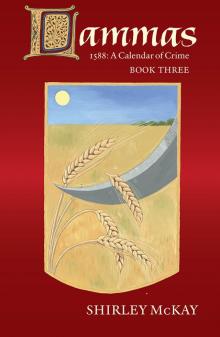 Lammas
Lammas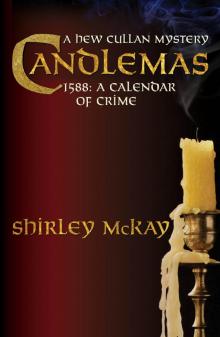 Candlemas
Candlemas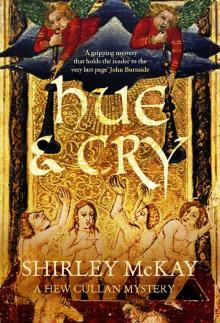 Hue and Cry
Hue and Cry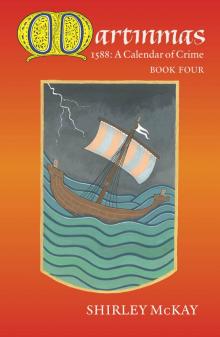 Martinmas
Martinmas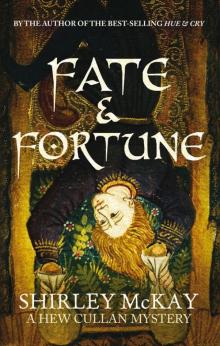 Fate and Fortune
Fate and Fortune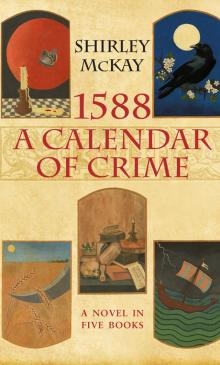 1588 A Calendar of Crime
1588 A Calendar of Crime Time and Tide
Time and Tide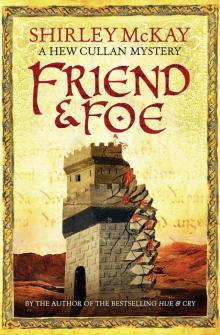 Friend & Foe
Friend & Foe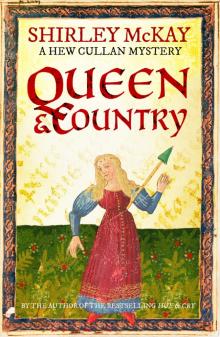 Queen & Country
Queen & Country